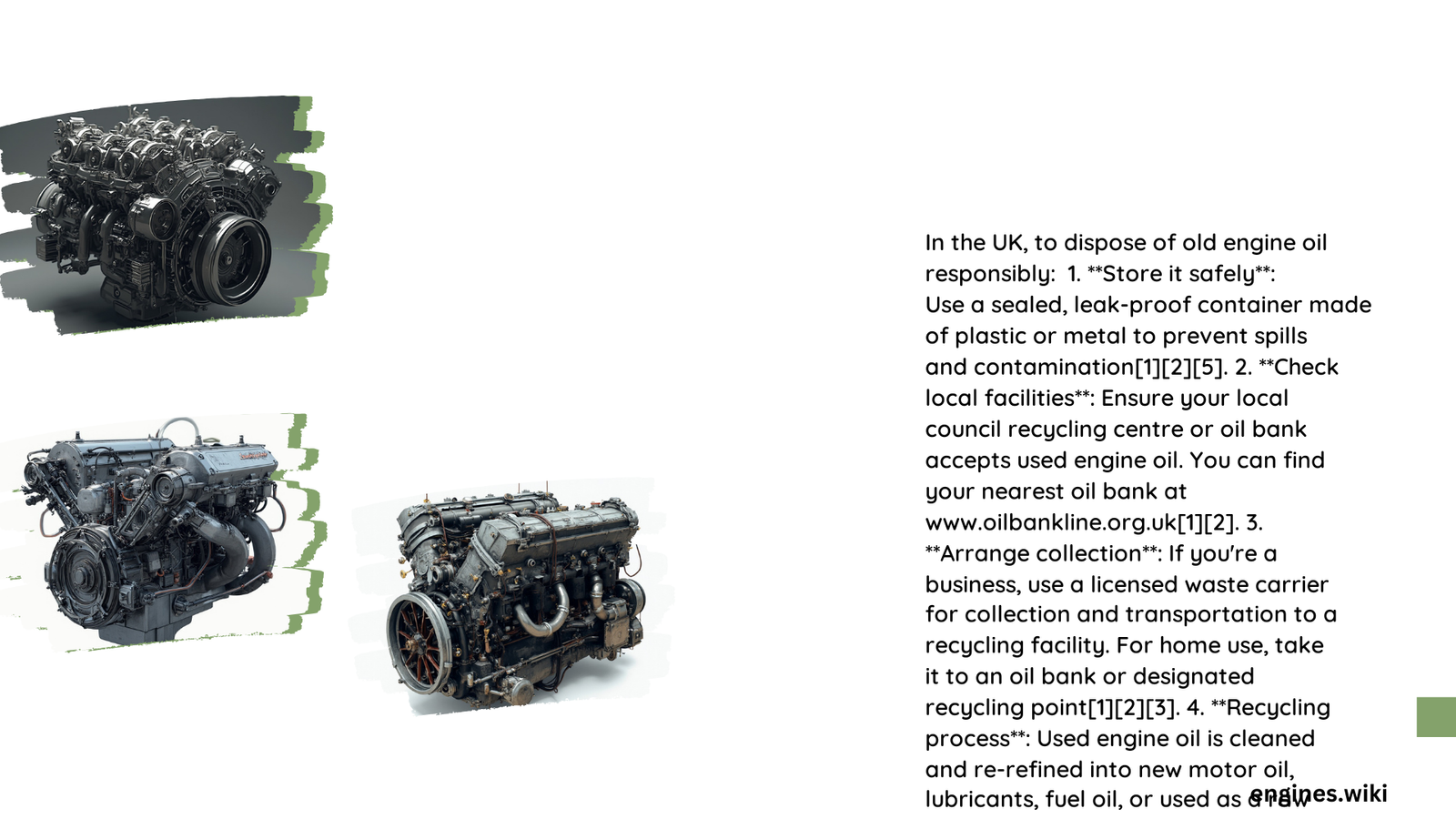Disposing of old engine oil in the UK requires careful attention to legal and environmental regulations. Vehicle owners and businesses must follow specific guidelines to ensure safe, responsible disposal that protects the environment and complies with national waste management standards. This comprehensive guide will walk you through the precise steps for handling used engine oil, from collection to recycling, while avoiding potential legal pitfalls.
Why Proper Engine Oil Disposal Matters?
Used engine oil is a hazardous waste that can cause significant environmental damage if not handled correctly. A single litre of improperly disposed oil can contaminate up to 1 million litres of fresh water, making responsible disposal crucial for environmental protection.
What Are the Legal Requirements for Engine Oil Disposal?

Compliance with UK Regulations
| Regulation | Key Requirements |
|---|---|
| Control of Pollution (Oil Storage) Regulations | – Secondary containment for oil storage |
| – Prevent spills and leaks | |
| – Applicable for businesses storing over 200 litres | |
| Waste Duty of Care Regulations 2005 | – Responsible disposal through licensed carriers |
| – Maintain disposal records for 2 years | |
| – Proper documentation of waste transfer |
How to Prepare Used Engine Oil for Disposal?
Safety and Preparation Steps
- Personal Protection
- Wear protective gloves
- Use safety goggles
-
Work in a well-ventilated area
-
Containment Guidelines
- Use leak-proof containers
- Clearly label containers as ‘Used Engine Oil’
- Ensure oil is cool before transferring
- Avoid mixing with other substances
Where Can You Dispose of Old Engine Oil in the UK?
Collection Points and Methods
- Local Council Recycling Centres
- Most councils provide dedicated oil collection points
- Free disposal for household quantities
-
Check local council website for specific locations
-
Automotive Service Centres
- Many garages and service centres accept used oil
- Often provide free disposal for customers
-
Ensure they are licensed waste carriers
-
Commercial Recycling Facilities
- Specialized facilities for larger quantities
- Provide comprehensive waste management services
- Offer collection and recycling solutions
What Happens to Recycled Engine Oil?
Recycling Process Overview
The recycling of used engine oil involves several critical steps:
– Collection from authorized points
– Cleaning and removal of contaminants
– Re-refining into base oil
– Repurposing for various industrial applications
Environmental Impact of Proper Disposal
Consequences of Improper Disposal
- Water Contamination: One litre can pollute 1 million litres of water
- Soil Degradation: Toxic chemicals harm ecosystem
- Wildlife Risks: Harmful to plants and animals
- Potential Legal Penalties: Fines up to £50,000 for improper disposal
Best Practices for Engine Oil Management
Recommended Approach
- Always use licensed waste carriers
- Keep detailed disposal records
- Store used oil in approved containers
- Never pour oil down drains or on the ground
- Consider professional collection services for large quantities
Cost Considerations
Disposal Expenses
- Household disposal: Typically free at council centres
- Business disposal: Varies by quantity and service provider
- Professional collection: Prices range from £50-£200 depending on volume
Final Recommendations
Responsible engine oil disposal is a critical environmental and legal obligation. By following these guidelines, UK residents and businesses can ensure safe, compliant, and environmentally friendly waste management.
Reference:
– Environment Agency
– DVLA Waste Regulations
– UK Recycling Guidelines
